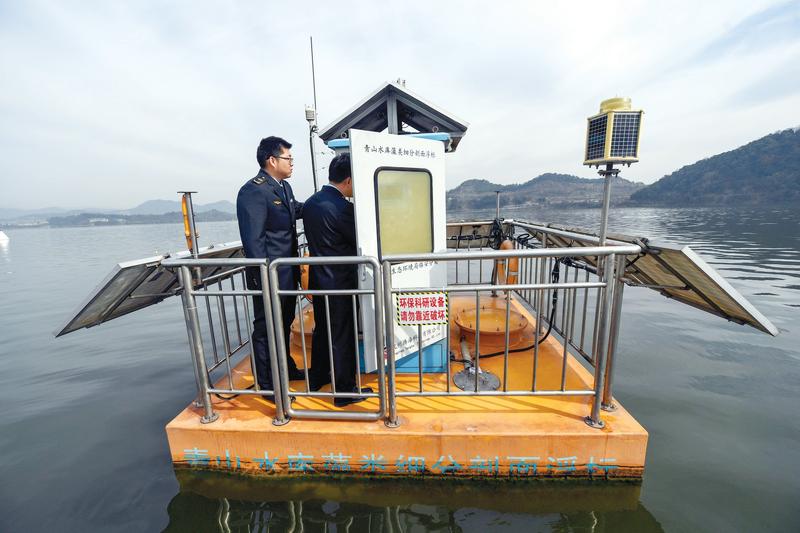 (SONG CHEN / CHINA DAILY)
(SONG CHEN / CHINA DAILY)
Qu Geping, 92, the first director of China’s Environmental Protection Agency, has been looking back to the 1972 United Nations Conference on the Human Environment held in Stockholm, the Swedish capital.
Staged from June 5 to 16 and also known as the Stockholm Conference, the event was the first global gathering of its kind to make the environment a major issue.
“Not many people in China had any idea of modern environmental concepts before the 1970s,” Qu said.
In the past 50 years, huge progress has been made on environmental issues.
In a written address to a recent high-level online policy dialogue, one of the events held to mark the 50th anniversary of the Stockholm Conference, Qu said, “In the course of human environmental protection, China has transformed from a passive, then active participant, to a major player.”
Qu said the conference was one of the most important international gatherings joined by China immediately after its return to the UN in 1971.
“It offered us an opportunity to go out of the country to see the world, and made us begin to wake up to existing environmental problems. It started a great new journey for Chinese people on environmental awakening,” Qu added.
A set of principles for sound management of the environment, including the Stockholm Declaration and Action Plan for the Human Environment, was adopted at the 1972 conference.
The Declaration marked the start of a dialogue between industrialized and developing countries on the relationship between economic growth, pollution and the well-being of people worldwide. The creation of the UN Environment Programme was one of the conference’s key outcomes.
After the Stockholm Conference, the Chinese government held the first national environmental protection meeting in 1973, led by then premier Zhou Enlai, Qu said. The meeting marked the start of environmental protection work in China.
“Following nearly five decades of endeavors, China has witnessed remarkable achievements in environmental pollution control and natural ecosystem conservation,” Qu said.
 Volunteers patrol the river at Guitou village, Yongzhou of Central China’s Hunan province. (HE HONGFU / XINHUA)
Volunteers patrol the river at Guitou village, Yongzhou of Central China’s Hunan province. (HE HONGFU / XINHUA)
For example, when the People’s Republic of China was founded in 1949, the nation’s forest coverage rate stood at 8 percent. As of last year, the rate had risen to about 23 percent, official figures show.
China accounted for 25 percent of the global net increase in leaf area from 2000 to 2017, according to data from NASA satellites.
Qu said that despite the environmental challenges posed by high-speed industrialization and urbanization after the reform and opening-up policy was introduced in the late 1970s, China has taken solid steps in establishing and improving legal, policy and governance systems for environmental protection.
These systems “have laid good foundations for the country to further forge ahead with sustainable development, promote the construction of ecological civilization and green, low-carbon and circular development”, he said.
Ecological civilization is a concept promoted by President Xi Jinping for balanced and sustainable development featuring harmonious coexistence between humans and nature.
However, Qu acknowledged that China has yet to completely address its environmental problems. “While old problems have been solved, some new ones are emerging,” he said.
“China faces the contradiction between unbalanced and inadequate development and people’s ever-growing needs for a better life. Environmental problems are a major part of the contradiction.”
But due to remarkable environmental improvements made since the 18th National Congress of the Communist Party of China in 2012, Qu is confident that the country will realize its Beautiful China initiative.
Since Xi and the Party’s central leadership placed ecological civilization top of the agenda, huge environmental changes have taken place.
“I believe that as long as the country unswervingly upholds and implements Xi Jinping Thought on Ecological Civilization and implements the Party leadership’s strategic plan on the Thought, we will surely make Beautiful China a reality,” Qu said.
Dimitri de Boer, chief representative for China of ClientEarth, an environmental law organization, has been in the country for two decades. He and his family have witnessed the rapid environmental improvements referred to by Qu.
 Environmental workers check water monitor facilities at Qingshan Lake, Hangzhou of East China’s Zhejiang province. (XU YU / XINHUA)
Environmental workers check water monitor facilities at Qingshan Lake, Hangzhou of East China’s Zhejiang province. (XU YU / XINHUA)
In 2014, due to poor air quality in Beijing, de Boer said his wife wanted to leave China. “She said we should really move to another country … with good air quality,” he recalled.
However, de Boer said air quality has significantly improved in recent years. The annual average density of PM 2.5 particulate matter in Beijing fell from 89.5 micrograms per cubic meter in 2013, the first year the air pollutant PM 2.5 was monitored in the city, to 33 mcg per cu m last year. Generally, air quality nationwide has also greatly improved.
“The air quality experience is the most striking example of how China really woke up to this problem,” de Boer said. “And it wasn’t just the government. The whole population started to become very concerned about air quality around 2014.”
De Boer has found that Chinese people are increasingly concerned about climate change and biodiversity conservation as two major global issues.
“Climate action is especially popular now,” he said, adding that he has found a strong interest among his friends at the Ministry of Ecology and Environment on topics concerning greenhouse gas emissions.
Martin Lees, former secretary-general of the Club of Rome, which was created to address crises facing humanity and the planet, praised the rapid progress made by China in tackling climate change.
“When China realized that it was vulnerable to climate change — when it became an issue for China itself — they moved pretty rapidly and very intelligently to tackle the problem,” he said.
Lees is also a former member of the China Council for International Cooperation on Environment and Development, a high-level central government think tank.
He said an integrated strategy to address climate change was developed throughout the government, with a leading group of ministers chaired by Vice-Premier Han Zheng established to implement the strategy.
“This was considered very high level and very important,” Lees said, adding that China adopted an all-of-government approach, unlike other countries, which placed this issue in the hands of their environment ministers.
 Volunteers in speed boats monitor water conditions in Lehai Reservoir of Yongzhou, Central China’s Hunan province. (JIANG KEQING / XINHUA)
Volunteers in speed boats monitor water conditions in Lehai Reservoir of Yongzhou, Central China’s Hunan province. (JIANG KEQING / XINHUA)
He added that he looks forward to seeing more action from China as global efforts are made to guarantee the survival of humankind from the climate crisis.
Wang Jinnan, head of the Chinese Academy of Environmental Planning, said the nation’s development has been increasingly green and low-carbon.
From 2013 to last year, China’s GDP rose by 94 percent, while the number of cars nationwide grew by 150 percent, he said.
Wang, also an academician at the Chinese Academy of Engineering, said that during this time, energy consumption and carbon emissions per unit of GDP fell by 16 percent and 22 percent respectively.
Siddharth Chatterjee, UN resident coordinator in China, said that due to the nation’s size and population, it is the world’s largest emitter of carbon dioxide. However, China is also at the cutting edge of pivotal technologies for a green transition, such as renewables and energy grid infrastructure.
In this respect, the country has great potential to fast-track and accelerate domestic and international processes for such a transition, while meeting and beating its climate targets, he said.
To date, the installed capacity of non-fossil energy in China exceeds 1.1 billion kilowatts, equivalent to the capacity of 50 Three Gorges Dams, the world’s largest-capacity hydropower station.
While forging ahead with domestic environmental progress, China, as a firm upholder of multilateralism, has contributed to global climate governance.
Since the Stockholm Conference — the first multilateral meeting of the international community to tackle climate change — the nation has promoted the building of a fair and rational global climate governance system for win-win results, according to Xie Zhenhua, China’s special envoy for climate change affairs.
Xie, 72, is a former minister at the State Environmental Protection Administration, which was upgraded from the Environmental Protection Agency in 1998.
Since the Stockholm Conference, China has also taken part in a series of landmark events on global climate progress. These events include the establishment of the Intergovernmental Panel on Climate Change in 1988, and the signing of the United Nations Framework Convention on Climate Change and the Paris Agreement, in 1992 and 2015 respectively.
Xie added that China, led by President Xi, made historic and fundamental contributions to the Paris treaty being reached, signed and implemented.
He noted that in 2014, Xi and then United States President Barack Obama jointly announced the two nations’ post-2020 climate targets, prompting more than 180 countries to detail their targets before the UN Climate Change Conference in Paris the following year.
In 2016, Xi and Obama jointly handed to UN Secretary-General Ban Ki-moon the legal instruments for joining the Paris Agreement, adding powerful momentum to the drive for the agreement to take effect less than a year after it was signed, Xie added.
When former US president Donald Trump delivered a hammer blow to the global battle against climate change by announcing the withdrawal of the US from the accord in June 2017, Xi reiterated China’s commitment to multilateralism.
 A watchtower stands in Saihanba Forest Farm, the world’s largest man-made forest, in North China’s Hebei province.
(MOU YU / XINHUA)
A watchtower stands in Saihanba Forest Farm, the world’s largest man-made forest, in North China’s Hebei province.
(MOU YU / XINHUA)
Addressing the opening session of the World Economic Forum Annual Meeting 2017, Xi said: “The Paris Agreement is a hard-won achievement which is in keeping with the underlying trend of global development. All signatories should stick to it instead of walking away from it, as this is a responsibility we must assume for future generations.”
As the world recovers from the COVID-19 pandemic, Xi has injected strong impetus to global climate actions with a series of new pledges, Xie noted.
In 2020, for example, the president announced that China aimed to peak carbon dioxide emissions before 2030 and realize carbon neutrality before 2060. Last year, he vowed that the nation would stop building coal-fired power plants overseas.
Xie said that despite being a developing country itself, China has made persistent efforts to help poor nations in their climate actions. Since 2011, for example, China has allocated 1.2 billion yuan ($176.8 million) for South-South cooperation on climate change.
To date, China has signed 41 collaboration agreements on climate change with 36 developing countries. It has also provided training programs for some 2,000 officials and technicians in climate-related posts from 120 nations.
Xie said, “Five decades after the Stockholm Conference, no matter what happens internationally, no matter what challenges confront nations around the world, China will stick to its steadfast resolve to tackle climate change and be an important participant, contributor and torchbearer in global endeavors for an ecological civilization.”
Last year, 3.2 million electric vehicles, half the number sold globally, were bought on the Chinese mainland.
Huang Runqiu, head of the Ministry of Ecology and Environment, the biggest national environmental authority, which was established in a State Council reshuffle in 2018, stressed China’s determination to continue contributing to global environmental governance.
“Currently, the planet is confronted with three major crises — climate change, biodiversity loss and environmental pollution. Joint and concerted efforts are needed from different nations to safeguard the Earth,” he said.
By adhering to the vision of building a community with a shared future for mankind, first proposed by Xi in 2013, Huang said China will endeavor to contribute more of its wisdom and solutions to global sustainable development.
“China will persevere in jointly charting the course for global ecological civilization with other nations. It will make intensified efforts to promote the building of a green Belt and Road Initiative and strive to make greater contributions to global environmental governance,” Huang added.


